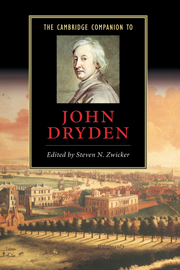Book contents
- Frontmatter
- Part 1 Pleasures of the imagination
- 1 Composing a literary life
- 2 Dryden and the theatrical imagination
- 3 Dryden and the energies of satire
- 4 Dryden and the imperial imagination
- 5 Dryden and the invention of Augustan culture
- 6 Dryden’s triplets
- Part 2 A literary life in Restoration England
- Part 3 Courting and complying with danger
- Further reading
- Index
- Series List
2 - Dryden and the theatrical imagination
from Part 1 - Pleasures of the imagination
Published online by Cambridge University Press: 28 May 2006
- Frontmatter
- Part 1 Pleasures of the imagination
- 1 Composing a literary life
- 2 Dryden and the theatrical imagination
- 3 Dryden and the energies of satire
- 4 Dryden and the imperial imagination
- 5 Dryden and the invention of Augustan culture
- 6 Dryden’s triplets
- Part 2 A literary life in Restoration England
- Part 3 Courting and complying with danger
- Further reading
- Index
- Series List
Summary
Dryden's most enduring early work as dramatist is not a play, but an essay that reads like one. In An Essay of Dramatic Poesy (1667), four speakers take up in turn the questions of the drama that would preoccupy Dryden throughout his theatrical career. Of the four, Neander, endorsing modern over ancient, English over French, tragicomedy over modes more mannerly and less mixed, and rhyme over blank verse, gets the most space, the best lines, and the last word. But the Essay accords each contradictory position its own energy and heft. “It will not be easy,” Samuel Johnson wrote in his “Life of Dryden,” “to find in all the opulence of our language a treatise so artfully variegated with successive representations of opposite probabilities . . .”
The successive representation of opposite probabilities is the playwright’s stock in trade, and one of Dryden’s chief accomplishments as dramatist was to devise new ways of crafting this commodity and of purveying it to audiences peculiarly situated to savor them. The Essay provides abundant foretaste of his technique. Though Neander appears to prevail, or at least preponderate, Dryden stages the entire conversation in such a way as to call the very notion of prevailing into question. He sets the dialogue at a historical moment two years before the Essay first appeared: “It was that memorable day, in the first Summer of the lateWar, when our Navy ingag’d the Dutch.”
- Type
- Chapter
- Information
- The Cambridge Companion to John Dryden , pp. 15 - 36Publisher: Cambridge University PressPrint publication year: 2004



